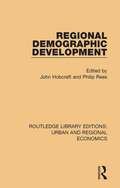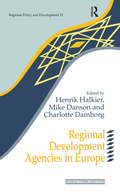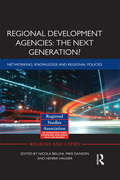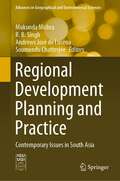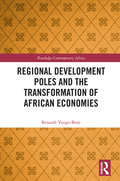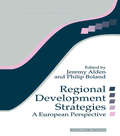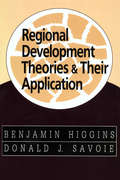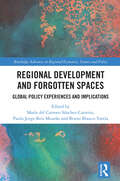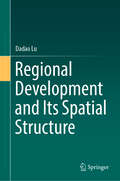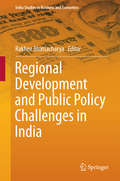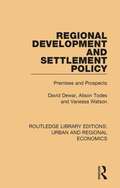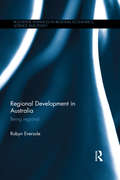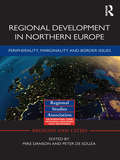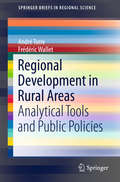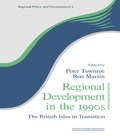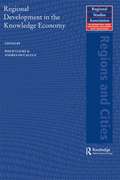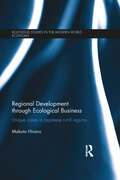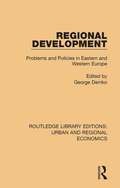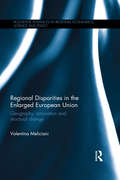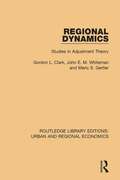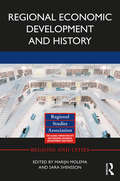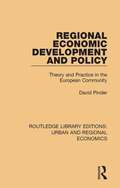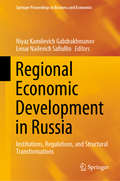- Table View
- List View
Regional Demographic Development (Routledge Library Editions: Urban and Regional Economics #8)
by John Hobcraft Philip ReesOriginally published in 1979. This volume brings together the work of distinguished demographers, geographers, statisticians and policy-makers who look in detail at various mechanisms by which regional population structures develop. The introduction deals with a synthesis of the area covered in the book and this is followed by the four major sections of population history, fertility, migration and population projections. The book provides the reader with a comprehensive and unique picture of regional populations and demographic development viewed from a variety of temporal and methodological perspectives, and will be of considerable value to all those connected with population studies and regional studies.
Regional Development Agencies in Europe (Regions and Cities #Vol. 21)
by Henrik Halkier Mike Danson Charlotte DamborgIn the past decade Europe has seen much change, and at the same time the importance of the regional perspectives has significantly increased. Regional Development Agencies in Europe brings together experiences of Regional and Development Agencies throughout Europe to provide material for the first major comparative study of bottom-up regional policy across the continent. Using an analytical framework developed by editors, the contributors evaluate the long term potential and limitations of the RDAs in terms of promoting regional and economic development. Institutional and other preconditions for successful regional polices are identified, and combined with a broad analytical and geographical coverage that includes Eastern Europe, a clearer picture of the relevance of the RDAs emerges.
Regional Development Agencies: Networking, Knowledge and Regional Policies (Regions and Cities #59)
by Nicola Bellini Henrik Halkier Mike DansonAcross Europe, regional development agencies (RDAs) have become a central feature of regional policy, both as innovative policy-makers and as the implementers of programmes and initiatives originating from the national or European level. By drawing on a combination of conceptual reflection, surveys, comparative research, and systematic use of critical case studies, this book provides a new point of reference by identifying key features of the current, and, indeed next, generation of regionally-based economic development organisations.
Regional Development Banks in Comparison
by Ruth Ben-ArtziIn a study that contributes to IR and IPE theory, Ruth Ben-Artzi raises substantive issues relating to aid, development, international relations and globalization. Regional development banks (RDBs), designed by politicians and economists to maneuver through labyrinths of economic, social, and political development, possess the potential to be central players in the long-term planning involved in healing and advancing poverty-plagued regions. However, RDBs in particular have received little attention. With a systematic analysis comparing four central regional development banks, this book explores why there's a variation in strategy despite similar institutional design. The formal arrangements and raison d'être of RDBs is to assist developing countries in the process of poverty alleviation - a task that is often a risky investment. Focusing on the dichotomy between their banking and development roles, Ben-Artzi demonstrates that RDBs are potentially critical catalysts in the fight against poverty, even with their institutional limitations.
Regional Development Planning and Practice: Contemporary Issues in South Asia (Advances in Geographical and Environmental Sciences)
by Soumendu Chatterjee R. B. Singh Mukunda Mishra Andrews José de LucenaThis book, through a bunch of systematic and analytical notes and scientific commentaries, acquaints the readers with the innovative methods of regional development, measurement of the development in regional scale, regional development models, and policy prescriptions. Conceptualizing development as a regional process is a geographer's brainchild, and the sense of region has long been rooted deeply in the fundamental research practices that geographers are accustomed to. The geographical perspective of regions entails conceptualizing them nested horizontally as the formal region and hierarchical relationships in space with spatial flows or interactions as the functional region. In geographical research, the region works as a tool by serving as a statistical unit of analysis. More importantly, however, regions serve as the fundamental spatial units of management and planning by specifying a territory or a part of it for which a certain spatial development or regulatory plan is sought. This book addresses the complex processes in different regions of the world, particularly South Asia, to perceive the regional development planning involved and the sustainable management practiced there. The book is a useful resource for socio-economic planners, policymakers, and policy researchers.
Regional Development Poles and the Transformation of African Economies (Routledge Contemporary Africa)
by Benaiah Yongo-BureThis book argues that the development of capital goods manufacturing industries in four relatively large African economies will create regional development poles, from which industrialization will spread to the smaller African countries. In this book, Benaiah Yongo-Bure explains the need for capital goods industries in Africa and shows how manufacturing can transform economies. He outlines the roles of the Democratic Republic of Congo (DRC), Ethiopia, Nigeria, and South Africa as potential regional development poles, showing how the existing economies, natural resources, and populations of these countries make them ideal candidates, while also considering possible challenges to industrialization. Finally, the author assesses what major infrastructural development is needed to link the countries and regions to increase the spread effects of economic growth. This book will be of interest to scholars and policy makers in economic development and regional development in Africa.
Regional Development Strategies: A European Perspective (Regions and Cities #Vol. 15)
by Jeremy Alden Philip BolandRegional development strategies have become the focus of attention in many countries in the 1990s. This textbook provides a conceptual, theoretical and empirical analysis of regional development strategies within a European context It examines the various regional development strategies which are currently being pursued within the regions of Europe - defined in its loosest term to include East and West. The book describes how many different European regions are attempting to reduce regional disparities by engaging themselves in coherent and focused regional development strategies, and there is also private sector approach to regional economic development. There are many case studies from Europe and from other parts of the world, including Japan, thereby providing lessons that different countries and regions can learn form each other.
Regional Development Theories and Their Application (Regional Development Theories And Their Application Ser.)
by Benjamin HigginsThroughout the world today former nation-states, as disparate as Yugoslavia, Somalia, and Canada, have either disintegrated or threaten to splinter into regions. The conflicts are economic, social, ethnic, linguistic, religious, political, and cultural. Higgins and Savoie analyze the reasons for these conflicts and show why attempts to eliminate regional disparities within nations have been largely unsuccessful. This volume is a highly readable, comprehensive survey of the literature and current debates in the fields of regional economics, development, policy, and planning.
Regional Development and Forgotten Spaces: Global Policy Experiences and Implications (Routledge Advances in Regional Economics, Science and Policy)
by María del Carmen Sánchez-Carreira Paulo Jorge Reis Mourão Bruno Blanco-VarelaThis book constitutes a novel contribution, combining recent theoretical developments and empirical contributions, as well as the recent and latest trends and challenges on the issue of Forgotten Spaces. Forgotten Spaces - like the Forgotten Regions, in particular - are spaces that in potential can and do create significant value (if their resources are properly rediscovered) and create many potential costs (if these spaces are increasingly neglected by economic agents). The editors have identified a gap in current research because there is not enough empirical evidence about these places, as well as about the role of their actors. Abandoning regions can lead to, for example, pollution, uncontrolled forest fires, vandalism heritage deterioration, and potentially untreated industrial facilities, carrying potential costs not only in environmental sustainability, but also in values such as landscape aesthetics. Thus, this book reflects on the dimensions of the identification of such Forgotten Spaces, on the design of policies focused on minimizing associated costs and on the scope of programs to promote these areas, not only for upgrading them but also for promoting their environmental sustainability. The comparative approach of the empirical part also allows knowledge and experience from diverse longitudes and latitudes. The editors highlight the richness of the experience of Latin American countries, the polarization and interesting experiences from several sector rediscovered in Europe, as well as the holistic cases coming from several African experiences. This book will attract the attention of academicians, politicians and ultimately the attention of all decision-makers who most likely are forgetting many of the Spaces around them.
Regional Development and Its Spatial Structure
by Dadao LuThis book describes the progress and prominent theories of regional development research in the past decades, especially in the past decade, discusses the industrial structure, spatial structure, resources, and environment, as well as a series of practical issues, and reveals the general characteristics of spatial structure evolution in the process of regional development. The research on the issues of regional development has become the frontier of relevant disciplines since the 1950s, and much progress has been made in the process of solving practical problems in social and economic development. This book provides an in-depth and systematic demonstration of the "point-axis system" theory of regional exploitation and development as well as the T-shaped structure of China's regional economic action in theory and practice and discusses the impact of location differential rent, restricted accessibility, technological innovation, etc., on regional development theoretically. This book is used as a reference for planning, scientific research, and teaching personnel in territorial expansion, regional economy, human geography, etc.
Regional Development and Public Policy Challenges in India
by Rakhee BhattacharyaThis book emphasizes the need for experimenting with more deliberate and rigorous policy processes to attain balanced regional development, which can promote both equity and efficiency in India's development discourse. The institutional mechanisms for dealing with regional imbalance in India have not been very successful so far. With rising discrepancies in development, demand for autonomy continues along with a new dimension of regionalism arising from submerged identity along with political and economic aspirations, which demanded new channels for solution. So far, attempts to create space for autonomy have possibly not optimally accommodated the conceptual mechanisms like equity and democratic process. Thus democratizing policy process using six pillars of voice: knowledge, objective, fundamental values, implementation framework and public awareness can ensure a better policy outcome for dealing with the persistent challenges of regional disparity in India. This book further focuses on the need for democratizing the policy process for regional development through discussion and inclusion. Such a transition needs innovation in policy regime, which can be attained through following six pillars (i) Democratic voice of stakeholders in policy development and implementation; (ii) Clear policy objectives that advance the common good, based on voice; (iii) Unbiased, sound and comprehensive knowledge and data bases. (iv) Consistency with constitutional values; (v) A sound implementation framework ensuring user-friendliness, transparency and rationality of decision-making processes, effective grievance redress, clear accountability and independent evaluation; (vi) Public awareness and support of policies with relevant and public participation in implementation.
Regional Development and Settlement Policy: Premises and Prospects (Routledge Library Editions: Urban and Regional Economics)
by Vanessa Watson Alison Todes David DewarOriginally published in 1986. This book focusses on a critical analysis of regional development strategy in South Africa, and shifts over time in that strategy. Regional development theory and thinking about settlement policy have developed largely independently of each other. This book clarifies some of the resulting confusion and points towards a greater integration of the two areas of understanding. The book provides an overview of shifts which occurred in national and regional development theory and the broader social, economic and political factors which influenced these shifts. It identifies the major policy implications of the various development approaches, with particular emphasis placed on the role of settlement policy. The differences between policy approaches and the debates surrounding them are identified and discussed.
Regional Development in Australia: Being regional (Routledge Advances in Regional Economics, Science and Policy)
by Robyn EversoleIn Australia, regions are not just geographic locations, they are also cultural ideas. Being regional means being located outside the nation’s capital cities and in the periphery of its centres of power and influence. Regional development in Australia is thus significantly different than its European or American counterparts. However, surprisingly little has been written about the unique dynamics of development in Australia's regions; this book has been written to fill this gap. In recent decades the Australian government has made repeated policy efforts to achieve sustainable development in its non-metropolitan areas. Over the same period, those who live and work outside the nation’s capital cities have come to identify as regional Australians. This book takes an anthropological approach to understanding the particularities of regional development in Australia. It draws upon rich, on-the-ground observations of towns, industries, universities, development organisations, and communities across different settings to provide an in-depth understanding of the subject. This book will be of interest to researchers and practitioners concerned with regional development and policy.
Regional Development in Northern Europe: Peripherality, Marginality and Border Issues (Regions And Cities Ser. #53)
by Peter De Souza Mike DansonThis book draws on work from across northern Europe and is parallel and complementary to the network itself. By establishing an intellectual and practically orientated framework and platform, and by bringing together contributions defining the state-of-the-art and potential development paths in the field, it is the first volume to offer a systematic and scientific view from the periphery.
Regional Development in Rural Areas
by André Torre Frédéric WalletThis book intends to provide analytical and policy tools for investigating the question of the development of rural and peri-urban areas. The aim is to shed some light on this topic and in particular to contribute to a better understanding of the link between issues of regional or territorial development and issues of rural development. The text addresses the question of the disputed notions and definitions of rural development in rural and regional studies, examines the literature of regional and territorial development and the policies of regional development and planning. It also presents scenarios for the future of rural areas, with a focus on European territories.
Regional Development in an Age of Structural Economic Change (Routledge Revivals)
by P. Rietveld D. SheferFirst published in 1999, this volume addresses various themes in regional development studies from the perspective of structural economic change. Particular attention is paid to factors having long-run implications for regional development, such as innovation and knowledge production. Innovation and research and development activities appear to take place at particular locations. This has implications for lung-run spatial and sectoral developments. Another factor is transport infrastructure; its impact on efficiency and equity is surveyed. Other themes covered relate to the role of tourism and adjustments in urban economies. The books aims to offer a balance between modelling and non-modelling approaches. In addition to country-specific contributions, some are offered at the European level.
Regional Development in the 1990s: The British Isles in Transition (Regions and Cities #No. 4)
by Ron Martin Peter TownroeThis book documents the changing nature and challenge of regional development in Britain and Ireland in the final decade of this century. In the first half of this book, region-by-region profiles review the experience of the eighties and reflect on the present climate, assessing problems and opportunities. The second half provides 25 commentaries on changes influencing the development of regions from questions of industry, technology and employment to the impact of national policy and 1992, and the prospects and capacity for regional policy and development.
Regional Development in the Knowledge Economy (Regions and Cities)
by Philip Cooke Andrea PiccalugaInternational contributors provide the first examination of the growing subject of regional knowledge-economy development. Illustrated by data and 'stylized' accounts, the international contributors chart the evolution of knowledge economies, questioning the way in which they work and criticize accepted theories and inform how places can cope in the knowledge economy. Based in concept on Cooke's Knowledge Economies (Routledge, 2002), Regional Development in the Knowledge Economy is a well-grounded work exploring this increasingly important theme with relevance to innovation systems and related economic development literature.
Regional Development through Ecological Business: Unique Cases in Japanese Rural Regions (Routledge Studies In The Modern World Economy Ser.)
by Makoto HiranoRegional disparity is one of the current pressing social issues. Many countries lack basic infrastructures of establishing a new business or industrial cluster. The book argues that existing arguments which have mostly focused on macroscopic view of economy of society or industries may be misguided. The book delivers a refreshing insight from microscopic view of enterprise/business management and how businesses can achieve sustainable development at enterprise level. The book includes case studies of concrete examples to illustrate how a successful model can be put in place to effect sustainable development at enterprise level. The implementation of sustainable development is also a closely connected knowledge management. This knowledge management looks at intangible assets such as tacit knowledge, social capital, ecological resources, art and so forth. It is also tightly related to regional issues. This book bridges the relationship between knowledge management and regional issues from the standpoint of sustainable development and illustrates how they can be integrated to overcome the constraints to grow. The clarity and well-founded research of the book makes it a useful reference for students, researchers and businesses.
Regional Development: Problems and Policies in Eastern and Western Europe (Routledge Library Editions: Urban and Regional Economics)
by George DemkoOriginally published in 1984. This volume brings together papers concerned with the problems of regional development in both Eastern and Western Europe. These include regional, economic, and social inequalities; lagging and backward regions; and constricted flows of labour. This book provides identification, comparison, analysis and discussion of regional development problems in Eastern and Western Europe. It discusses the latest trends in regional policy, assesses their effectiveness and puts forward innovative thinking on the various issues and how they should be tackled in future.
Regional Disparities in the Enlarged European Union: Geography, innovation and structural change (Routledge Advances in Regional Economics, Science and Policy)
by Valentina MelicianiThe last twenty years have seen an increase in European integration and the emergence of the technological revolution. Although tighter integration coupled with technological innovation should facilitate cross-regional convergence, some European regions have managed to jump ahead while others have been left behind. This book examines the regional characteristics that favour growth and analyses the relevance of innovation, socio-economic and structural factors in shaping regional economic disparities. In this book, particular attention is devoted to the EU enlargement towards the East, to its consequences on Europe’s traditional North-South divide, and to the increasing regional disparities in new member states after the transition. It demonstrates the growing importance of innovation and human capital in explaining the increase in income and employment disparities in old EU members, particularly after the 2008 financial crisis. It also shows that for newcomers, regional disparities are essentially linked to socio-economic factors as capital regions approach Western standards, while others - mainly old industrial regions and peripheral ones - lag behind. This book integrates theoretical discussion with empirical evidence and will appeal to regional scientists interested in regional inequalities, and to policy makers concerned with devising effective strategies to tackle regional disparities in Europe.
Regional Dynamics: Studies in Adjustment Theory (Routledge Library Editions: Urban and Regional Economics)
by Gordon L. Clark Meric S. Gertler John E. WhitemanOriginally published in 1986. This book is concerned with how regional economies adapt and respond to changing circumstances, and especially with the spatial system and processes of restructuring. Throughout the book there is a methodological commitment to adjustment theory - a unique analytical framework for the study of the dynamics of advanced capitalist economies. Instead of homogenising space in the manner of neoclassical economic theory, the authors focus on adjustment processes that produce and reproduce spatial differentiation. The most important facets of regional economic structure are covered – employment, wages, prices, migration, and capital investment – in terms of their own dimensions and their connections with the larger theoretical framework. Each part of the book develops one particular dimension of regional adjustment, and each has an overview and summary. Within each part, there is a sequence of related studies focussing on the empirical aspects, theoretical logic, and distributive consequences of regional adjustment.
Regional Economic Development and History (Regions and Cities)
by Marijn Molema Sara SvenssonRegional Studies is inextricably intertwined with history. Cultural and institutional legacies inform choices between different policy options, meaning that the past plays a crucial role in how we think about regional economic development, planning and policy. Through a selection of accessible theoretical, methodological and empirical chapters, this book explores the connections between regional development and history. Drawing on the expertise of scholars in several disciplines, it links history to topics such as behavioural geography, interdependence, divergence and regional and urban policy. This innovative book will be of interest to researchers across regional studies, planning, economic geography and economic history.
Regional Economic Development and Policy: Theory and Practice in the European Community (Routledge Library Editions: Urban and Regional Economics)
by David PinderOriginally published in 1983, when Europe’s economies were facing the worst recession since the 1930s, this book reviews the outcome of a quarter of a century of research and practical experience in the field of regional economic management. In the spatial context of the European Community, the author explores central issues by integrating the results of his own research with those of economists, geographers, economic historians and psychologists. It provides a wide survey of the subject, demonstrates the complexity of the spatial-economic systems which the regional economic planner seeks to modify, analyses the strategies for regional development employed by national and international agencies and offers a substantial annotated bibliography. Contradictions arising from the contrasting spatial perspectives of national governments and the European Commission are emphasised. Among other things, it concludes that many regional problems strongly reflect perception and behavioural factors as well as purely economic constraints.
Regional Economic Development in Russia: Institutions, Regulations, and Structural Transformations (Springer Proceedings in Business and Economics)
by Niyaz Kamilevich Gabdrakhmanov Lenar Nailevich SafiullinThis book gathers selected papers presented at the International Scientific Conference “Economics in the Changing World,” held on June 26-27, 2018 at the Institute of Management, Economics and Finance of Kazan Federal University (Kazan, Russia). The conference featured contributions by leading specialists in the field of management, territorial development, and state, regional and municipal management, covering the modern trends in the development of economic complexes and firms, economics of innovative processes, social policy, financial analysis, and mathematical methods in economic research. The book highlights new approaches for the development of various sectors of the Russian economy and individual markets, as well as for the efficiency of entrepreneurship in general. It also analyzes the concept, meaning and directions of the socio-economic development of the regional subjects in the Russian Federation. The scientific studies included make a significant contribution to the development of entrepreneurship, regional management, rationalization and optimization of resource use, state territorial administration, and sustainable economic growth in the regions and the transport infrastructure.
